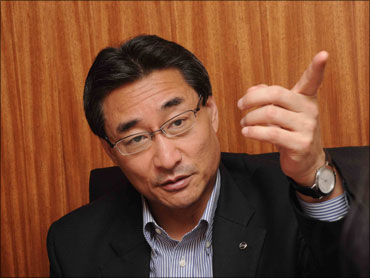
After global auto giants like Ford, Hyundai, Toyota, Honda, etc, it is the turn of another Japanese major to enter the Indian market.
In February 2008, Nissan in alliance with Renault signed a MoU with the government of Tamil Nadu to set up a manufacturing plant at Oragadam, near Chennai. The plant will have the initial capacity of 200,000 units per year which will go up to 400,000 units per year in full capacity.
As the production of Micra, the first car from Nissan-Renault, starts at the plant by the end of May, Kiminobu Tokuyama, managing director and chief executive of Nissan Motor India Pvt Ltd, talks to rediff.com about the company's strategy for India, the recession and the auto sector in general.
When did you start looking at India as a place for investment?
India is a very important strategic market for Nissan. Yes, Nissan has come to the Indian market a little late, later than other auto majors like Toyota, Hyundai, etc. But I am sure it is not too late.
On the contrary, do you feel you entered the Indian market at the right time? Last year, India was the second fastest growing auto market at 26.41% after China that grew at 42% when the auto industry was down all over the world.
Yes, I think so. Of course, we feel we could have come a bit earlier but then that is basically the company's strategy. As the Indian market will continuously be growing, I would say it is not too late. From that point of view, it is good timing.
. . .
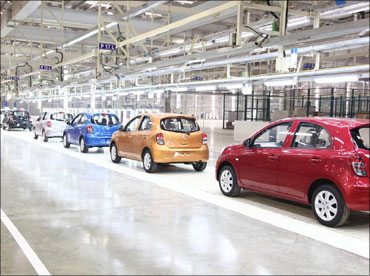
Are you looking at India only as a market or as a manufacturing hub from where you can export to other parts of the world too? Which attracted you the most; the market or the labour force?
Both. As a market itself, India is very attractive and very important for Nissan. Also, in India, we have a good supplier base. And India also has a highly skilled, experienced labour and a well established high-tech IT industry. All these combined make India an attractive manufacturing hub for Nissan's global strategy.
China is a bigger market and also an attractive manufacturing hub and you have presence in China also. How do you compare both these markets?
Nissan is a global player. And there is no difference to us between China and India. Both are important to us. Of course, market-wise, China is already a very big market. The forecast is that their demand will reach 16 million soon while India is a growing market.
We have been very successful in China. Last fiscal year, we sold over 750,000 vehicles there. So, I would say we had a very satisfying performance in the Chinese market.
Another interesting market is Russia. Because of the financial crisis, the market is still struggling and a little bit slower than China and India but we have been successful there. We built a manufacturing plant in St Petersburg three years ago. We have been successful in the growing market of Russia. Now, we have started our big operation in India.
. . .
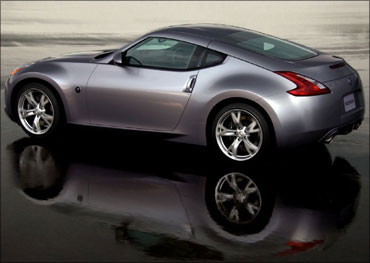
How much do you expect the Indian market to grow in the next few years?
I think Indian market will soon reach 3 million cars (annually). In a few years' time, it will reach 5-6 million cars as mentioned by (Nissan and Renault CEO) Carlos Ghosn. There is a huge growth potential for the Indian growth.
You are introducing the small car Micra here. Do you expect the small car segment to grow the maximum?
Yes. The total market will, anyway, be growing but if you compare segment by segment, the small car segment will grow faster than the other segments. That is why Nissan chose Micra as our entry car into the Indian market.
We will never be a niche player by focussing on any one segment. We will be there as a big player with our presence in all the segments.
Globally also, do you see faster growth in the smaller car segment?
Yes, not only in India, but globally too we see the same trend now. That is the future forecast we see. That is why Nissan has developed the 'V' platform, or the Versatile platform. That is the platform we have developed exclusively for the small car models.
. . .

With the talk about saving energy and protecting the environment gaining momentum, do you see the growth of small cars even in a developed market like the United States?
We see a shift even in the US market. According to the global automotive trend, there will be a shift to energy efficient and environment-friendly small cars.
From that point of view, what are Nissan's future plans?
First of all, we have not announced the details of Micra which we will announce soon. I can assure you that fuel efficiency of Micra is very competitive. Globally also, to be a leader in zero emission is one of Nissan's strategies.
All the surveys in India say that Indians look at the cost factor and fuel efficiency as major issues when buying a car. So, is Nissan taking these factors into consideration when you introduce Micra here?
Definitely. Also, safety.
. . .
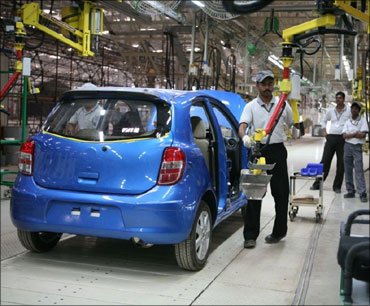
You will be manufacturing Micra at the Chennai plant. Are you doing it for the Indian market alone or for exports too?
For us, both the Indian market and the global market are important. We have come here with both the objectives. We have positioned India as a production hub for exports. The production for the Indian domestic market will start by end-May.
By mid-July, we will start production for the exports market. Our export market is more than 100 countries and it includes Europe, Africa and the Middle East. In Europe itself, we are looking at 35 countries. Next year, we will start producing a sedan too.
Will there be any difference between the Micra you manufacture for the Indian market and the one for exports?
The Micra for the Indian market will have some features that are tailor-made for the Indian market, while there will be some difference in the ones we make for, say, the European market taking into consideration the safety and emission norms that are prevalent there. So, there will be some differences.
. . .
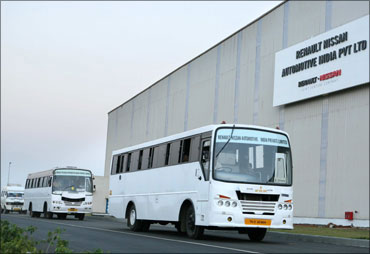
The auto industry was one of the worst hit in the economic recession. How badly hit were you?
Yes, it was a difficult time for all automobile manufacturers. After several years of successful performance, we came to a position where we had to show losses. But Nissan has been able to recover from the recession earlier than the other automobile manufacturers.
We knew we would successfully come out of the period and we managed to. We also knew the demand for automobiles would increase soon.
To come out of the difficult period, what we did was not only cut costs in many areas but make sales and marketing more efficient. At the same time, we invested in design and development too. That was because Nissan believed that the financial crisis was not the end of the world. Now we feel we are in a better position than we were in before the recession.
. . .
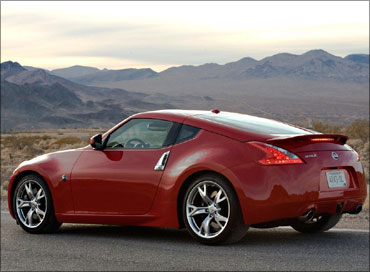
Financial downturn resulted in Detroit getting almost shut down while countries like China and India emerged as new manufacturing hubs. While the demand for vehicles went down in the West, it increased in this part of the world. Do you feel there will be a shift in not only demand but manufacturing also hereafter?
It may be true but recession may be one of the factors why a shift is taking place. There already was a shift in the demand from the developed markets like the US, Europe and Japan to the emerging markets. It started showing even before the recession.
We had realised that there would be more demand in emerging markets. Yes, many automobile manufacturers had to make changes in their strategy with new initiatives.
In the case of Nissan, when we decided to start our manufacturing facility in India, the financial crisis had not hit the world. We were already in China when the recession started. But the recession has made manufacturers take faster and drastic decisions to come out with more innovative designs.
You chose Chennai as the place to start your manufacturing plant. Was it because the other auto majors like Ford, Hyundai, etc were here?
I don't think we chose Chennai because they have been here for some time. Not only Chennai but Bangalore also has a good supplier base. In fact, the entire southern area has a good supplier and good technology base.
The quality of labour also is quite good in this part. Also, there is a strong support from the state government. There is a good port and the Ennore Port is being improved.
. . .
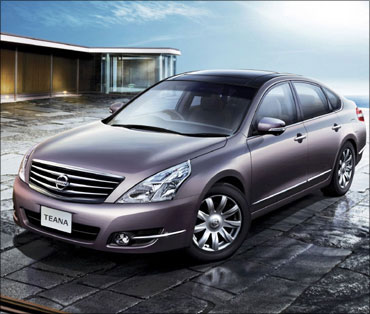
Are you happy with Chennai so far?
We are quite satisfied so far with the progress of the project. In 21 months from the start, we could finish the plant. It is a record for even Nissan to build such a huge manufacturing plant in such a short period. We had all the expertise but we would not have been able to achieve this without the support of Tamil Nadu government and the labour force.
However, the business team headed by the minister of economic trade and industry from Japan was here, and we had a meeting with Mr Stalin (deputy chief minister of Tamil Nadu). After appreciating the support the government had given so far, we have requested them to improve the road conditions.
The infrastructure has to improve. As you know, we will start shipping Micra both for the Indian market and for exports from our Oregadam plant. So we need good roads for speedy delivery.
Is it a cause for worry, the kind of roads we have in India?
Yes. Infrastructure is one area that has to improve. Japan is going to be a part of infrastructure building and that is why the minister came to India. The Delhi-Mumbai corridor is one such project. We are discussing another project between Chennai and Bangalore.
. . .
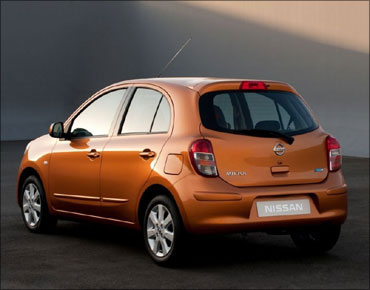
Any other drawback that worries you?
I don't think so. You have technology, you have good labour. Yes, if you can change the Chennai weather a little bit at least, it will be great! (laughs) Had it been a few degrees less, this place would have been much more attractive!
But it is very important to improve the road conditions.
How many units will be manufactured at the Oragadam plant in Chennai?
We plan to export 110,000 cars in the first year. It will go up to 180,000 the next year.
For the domestic market, we plan to hit 100,000 units per year.
Do you feel the US and Europe markets have stagnated?
Yes, somewhat. Not only the US and Europe markets, but Japan too. The US market is struggling to come out of the crisis. We don't expect the automotive demand in these countries to grow faster. It will decrease in Japan because of the decreasing population. The market has already saturated.
If you look how many cars are owned by people, you see that 800 in every 1,000 people own a car in the US, while it is only 8 in a 1,000 in India. Yes, there is a huge potential for growth in both India and China.